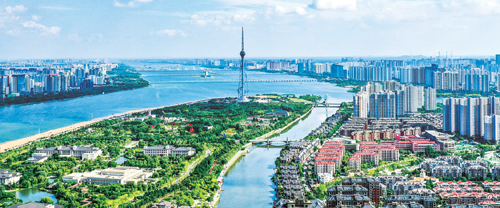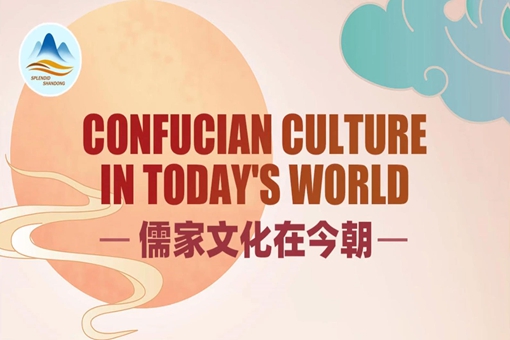Old revolutionary base forges ahead
By DI YINGNA and WANG SHANSHAN| (China Daily)| Updated : 2022-12-23
Print PrintWho Doesn't Say Our Hometown Is Good, the famous song from a 1963 film focusing on the Menglianggu Battle in May 1947 during the People's War of Liberation, remains a favorite throughout China even today. Its lyrics capture not only the rugged beauty of Yimeng, an old revolutionary base area in Shandong province, but also the deep bond between the Chinese people and the soldiers of the people's army.

An aerial view of Linyi city, Shandong province. SUN YUNHE/FOR CHINA DAILY
During those revolutionary years, more than 1.2 million people in the Yimeng base area, which is part of today's Linyi city, provided support to the people's army. More than 210,000 people enlisted in its ranks and took to the battlefield, and more than 100,000 died as martyrs. The base area produced a large number of pioneers and model figures, who passed countless moving revolutionary stories to succeeding generations.
Over the decades, the old revolutionary base area has forged ahead. Since 2012, the city of Linyi increased its total economic output by 300 billion yuan ($42.96 billion) to 546.55 billion yuan in 2021, becoming one of the top 20 prefecture-level cities in the country.
In early summer, the winding mountain roads of Xiacun township are flanked by thick clusters of cherry trees glittering with crimson fruits.
"Our village has planted more than 26.6 hectares of cherries," said Wang Xueliang, a local resident. "Now, on weekends, long queues of cars with passengers coming to pick cherries lining the roads."
Thanks to these cherries, once-impoverished villagers have been enjoying increasing prosperity in recent years.
Over the past few years, Linyi has implemented an initiative to boost the incomes of rural residents based on a "one industry per town, one product per village" approach, in a bid to carve out strengths in distinctive local industries.
Cherry orchards in Mishanzi and Shangcun villages in Xiacun township exceed 100 hectares, with annual output value reaching 20 million yuan.
Tanyi, another township, has focused on the timber industry, generating fiscal revenue of more than 1 billion yuan in 2021.
As one of the first areas in northern China to cultivate tea from the country's south, Zhubian township in Junan county is busy building up its green and white tea brands.
The residents of Honghua town, dubbed the "home of Chinese knot art", have increased their per capita income by nearly 10,000 yuan solely through Chinese knotting.
From promoting rural tourism, rural e-commerce, Yimeng handicrafts, and intangible cultural heritage, to advancing agricultural product processing, Linyi is making strong strides toward its ambitious goals for rural vitalization. In 2021, one-third of the townships and subdistricts of Linyi each generated fiscal revenue of more than 100 million yuan. The per capita disposable income of all Linyi residents has exceeded 30,000 yuan.
Commerce and logistics
Heavy goods vehicles with full loads exit Linyi Tianyuan International Logistics Park in an orderly procession. "The volume of freight leaving the park each day is about 30,000 metric tons, and the total volume of logistics is now worth 445 million yuan," said a representative of Tianyuan Logistics.
The old revolutionary base area lies amid mountainous terrain that once made it difficult to reach by road or water. After decades of arduous work, Linyi is gaining a reputation in the new era as a national logistics hub and city of commerce.
The city has 38 logistics parks, operating more than 200,000 vehicles, and a network of routes to many regions in the country. As one of the largest logistics hubs in northern China, Linyi increased its road freight volume alone to 369 million tons in 2021.
To complement a well-developed logistics setup, there is the Linyi Wholesale Markets, one of the largest constellations of markets in the country, comprising more than 120 professional wholesale markets with 60,000 stores. In 2021, the transaction volume of these markets was 540.26 billion yuan, and total logistics volume hit 806.57 billion yuan.
"By building a single market, we can stimulate the development of several industries, enrich a multitude of people, and provide a boost to an entire city. The development of markets has given rise to agglomerations of industries, personnel and resources for production, provided employment for more than a million workers, and driven the overall economic and social development of Linyi," said a Linyi Wholesale Markets representative.

 Insights from the 10th Nishan Forum
Insights from the 10th Nishan Forum  Confucian culture thrives: Integrating its wisdom into modern value
Confucian culture thrives: Integrating its wisdom into modern value  Confucianism's enduring influence: Shaping East, Southeast Asian civilizations
Confucianism's enduring influence: Shaping East, Southeast Asian civilizations